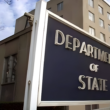The movement for a U.S. Department of Peace
By Bulletin Staff, July 3, 2007
I agree with Lawrence Wittner and Kate Hudson that there is a definite resurgence of nuclear
disarmament activity. In recent years we have also seen the emergence of a movement to establish a
Department of Peace. The Department of Peace offers a new approach to ending nuclear war. It will
build the infrastructure necessary to address violence at its root, strengthening practical and
effective means of nonviolent foreign relations at a federal level. The U.S. Department of Peace is
proposed by legislation in the House (H.R. 808), which
is cosponsored by 67 members of Congress. A Department of Peace will effectively increase our
ability to build peace as well as specifically work in support of nuclear weapon disarmament.
A Department of Peace will have both an international and domestic reach. Domestically, the
Department of Peace will support effective community peace-building initiatives such as
conflict-resolution training for police, peer mediation and conflict-resolution programs in
schools, and prisoner-rehabilitation initiatives that reduce recidivism rates. Internationally, the
Department of Peace will play a major role in prevention and de-escalation of conflicts, as well as
post-conflict reconstruction and reconciliation. A Department of Peace will also oversee the
creation and administration of a Peace Academy, intended to be a sister academy to the military
academies.
As currently outlined in H.R. 808, the Department of Peace will feature an Office of Arms
Control and Disarmament. The office will specifically work in support of disarmament of weapons of
mass destruction. There are numerous offices throughout the federal government in support of peace;
however, many of these offices and agencies are fragmented and spread throughout the government. A
Department of Peace will unify arms control with other peace-building offices and agencies.
The notion that there should be a section of the federal government specifically dedicated to
peace is not new. Benjamin Rush first called for an Office of Peace in 1792, and more than 100
bills have been submitted since in support of institutionalizing peace in the federal government.
The movement was resurrected with the April 2003 launch of the
Department of Peace campaign.
The US Department of Peace campaign is active in all 50 states and in more than 300
congressional districts. The
student
campaign formed in March 2006 and is active on 30 campuses. The legislation has been endorsed
by 20 city councils across the country, including Detroit, Atlanta, San Francisco, and Chicago. The
Peace Alliance
, which organizes the national department of peace campaign, coordinated its third
annual Mother’s Day “Peace of the Pie” National Action Day in May. Grassroots supporters from 38
states organized more than 250 contacts with offices of members of Congress. About 140 offices were
visited in the 2006 campaign. This year’s Mother’s Day action demonstrates the strength and growth
of the U.S. Department of Peace movement.
The movement is not only active in the United States. The
Global Alliance for Ministries and Departments of
Peace is made up of members from 23 countries, and 12 countries have active campaigns. The
Solomon Islands has formed a Ministry of Peace and Unity. And after a campaign lead by Nepali
youth, Nepal formed the
Ministry of Peace and Reconstruction in March.
The Department of Peace effort is focused on creating the infrastructure necessary to encourage
and support the growth of peaceful cultures. Nowhere in the highest echelons of U.S. government is
there a platform from which to launch such a focused, strategic approach to reducing and preventing
violence. The time has come for a fresh approach, and a movement has been born to make this vision
a reality.
Share: [addthis tool="addthis_inline_share_toolbox"]













